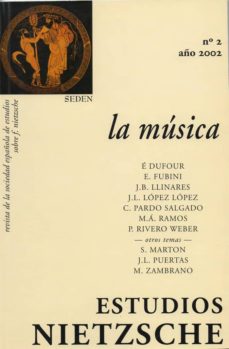La musa de Nietzsche
DOI:
https://doi.org/10.24310/EstudiosNIETen.vi2.8797Abstract
El joven adolescente contaba apenas con catorce años de edad y ya dejaba constancia de su opinión sobre aquella que sería su única compañera de vida, y anotaba en su diario: la música. Este artículo explora cómo la música no sólo fue una categoría esencial del pensamiento de Nietzsche, sino que él mismo fue compositor musical, y tanto para el compositor como para el filósofo, la música fue su verdadera musa.
Downloads
Metrics
References
Janz, C. P. F. Nietzsche, Der musikalische Nachlass, Basel 1976.
Nietzsche, F., De mi vida (1844–1858), tr. L. F. Moreno, Valdemar, Madrid, 1997.
Nietzsche, F., Fragmentos Póstumos I-IV (FP). Director ed. Diego Sánchez Meca. Madrid: Tecnos, 2006-2010.
Nietzsche, F., Obras Completas, I-IV (OC ). Director ed. Diego Sánchez Meca. Madrid: Tecnos, 2011-2016.
Nietzsche, F., Obras Completas, I-IV (OC ). Director ed. Diego Sánchez Meca. Madrid: Tecnos, 2011-2016.
Rohde, E., Psique, tr. W. Roces, Fondo de Cultura Económica, México, 1983.
Vattimo, G. Introducción a Nietzsche. Barcelona: Península, 2001.
Downloads
Published
How to Cite
Issue
Section
License
As of issue 21 (2021) this journal is published only in open access (diamond route).
From that number 21, like the previous numbers published in NIETZSCHE STUDIES, they are subject to the Creative Commons Acknowledgment-NoComercia-ShareIgual 4.0 license, the full text of which can be consulted at <http://creativecommons.org/licenses/by-nc-sa/4.0 >
It is the responsibility of the authors to obtain the necessary permissions of the images that are subject to copyright.
This work is licensed under a Creative Commons Attribution-NonCommercial-ShareAlike 4.0 International License.
Copyright generates two different rights: moral rights and patrimonial rights that EJFB recognizes and respects. Moral rights are those relating to the recognition of the authorship. They are rights of a personal nature that are perpetual, inalienable, unseizable and imprescriptible as consequence of the indivisible union of the author and his/her work.
Patrimonial rights are those that can be derived from the reproduction, distribution, adaptation or communication of the work, among others.







11.png)
